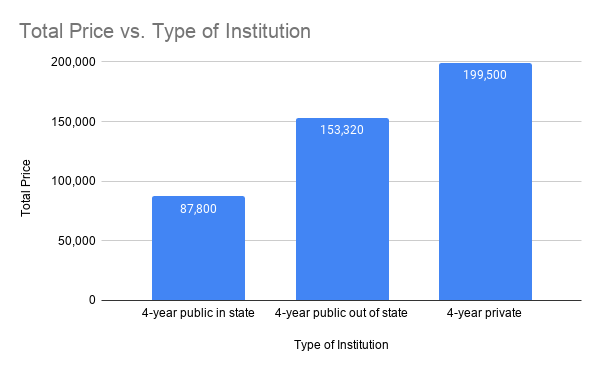
More recently, we launched bootcamps on Data Science and Data Analytics and would like to share with the hackers the material in which the author compares this popular in the West education format with the classical university one. Enjoy reading.
From the original author.
I entered Cornell University with a Bachelor of Science in Computer Science and an Engineering in Computer Science. I've been a Software Engineer for quite some time at companies like Salesforce, Amazon, and Twitter. I also educate people, prepare them for software development interviews. As a freelancer, I have worked with over 100 clients, including those who went to bootcamps and those who went to college. I have seen both sides, so my opinion is not biased.
Software engineering is in demand today. There are approximately 1.5 million software engineer jobs. According to forecasts, vacancies will increase by an astronomical 22% from 2019 to 2029 [1]. This means that by 2029 there will be about 33 million jobs. Software engineer jobs and vacancies can include solid social benefits. You can get paid vacations, compensation for phone bills, Wi-Fi bills, and more. It is quite understandable why more and more people are pursuing a career in this field.
Recently, bootcamps have appeared. They are attractive because of their availability and flexibility. Since 2013, the number of bootcamps has grown 11 times, and by the end of 2019 their number has reached about 23 thousand [2]. More and more people are visiting them to start a career as a software developer. But are bootcamps more effective than academic institutions? Can they really get a job as a software engineer?
TL; DR
If there is not enough money, I suggest going to a bootcamp or an online program associated with an accredited university. Otherwise, head to university to get formal training because it will give you a deep understanding of computer science. It will pay off in the long run. You will learn to think for yourself when solving complex problems in various computer science applications. These skills are useful in promotions. If you do decide to go for a bootcamp, please supplement it with reading material that focuses on data structures and algorithms. Also, I would recommend taking additional courses on platforms like Coursera, which specialize in topics like machine learning, databases, streams, etc.
A whole selection of additional courses can be found in these articles:
- "109 Free Data Science Courses"
- "Free Data Science Courses from Harvard University"
- "450 free courses from the Ivy League"

1. University - the traditional, old-fashioned way
The number one advantage of universities is the resources and breadth of courses offered. You can talk to professors about how the university is using computer science to solve real-world problems. Many professors are engaged in cutting edge research. You can gain hands-on experience in such research by joining his / her Ubiquitous Computing lab. When I was in undergraduate and postgraduate studies, I joined a research laboratory. It was great to see how computer science is working to mitigate health problems. I gained valuable experience that I could not get anywhere else.
Computer science is not the study of the syntax of languages. The syntax is the easiest part. The hardest part is understanding fundamental concepts and theories and learning how to apply them. The breadth of courses offered at universities allows you to gain a comprehensive understanding of computer science as you can dive deeply into some of its aspects. At the university, you can take classes in a wide variety of areas - from machine learning to database design, robotics to system security. There is no bootcamp where this is possible. Bootcamps are designed to give you hands-on training to help you get a job. They are not designed to teach theory and high-level concepts.
The second advantage of the university: you get a degree. This is important when selecting a resume for an interview. A tangible part of software development requires a bachelor's degree. However, more and more companies are moving away from this requirement and paying attention to projects and work experience.
The third advantage is career contacts. Many universities have established relationships with companies. These companies tend to be actively recruiting employees at this university. Workday, Google and Facebook have been actively recruiting staff from my university. Hundreds of companies come to the university to hire employees. Sometimes interviews take place the very next day.
Sounds amazing. What's the catch?
Going to these universities is a big investment. If you are going to study for a bachelor's degree for 4 years, then here is how much you need to pay for all the time:

Data from EducationData.org [3]. The range is $ 87,800 to $ 199,500. You may need loans for several years. It can be difficult to quickly build up savings and equity while trying to pay off a loan.
What about graduate school?
There are people with a non-tech bachelor's degree who want to develop software. For those considering postgraduate studies: you may not have a PhD degree. A master's degree will suffice. And here's how much a year of study costs.

Data from Peterson's book [5]. It should be noted that there are some universities where a master's degree can be obtained in a year or two years. Thus, depending on the program, tuition fees can range from $ 30,000 to $ 60,000 for a public university and from $ 40,000 to $ 80,000 for a private university. The difference between the programs is that the two-year program pays more attention to the research project. In addition, the two-year program's schedule is not as tight as the one-year program.
But it's still expensive. Are there alternatives?
MOOC (Massive Open Online Course) are extremely popular on Udacity or Coursera. Several universities partner with these platforms. A notable example is Georgia Tech's online Master of Science program in Computer Science. This program costs a total of $ 7,000. If you are not on campus and cannot work face-to-face with professors, this option may be fine.
2. Bootcamp is an unconventional way of teaching
Bootcamps are cheap compared to the 4-year university program, which is why they are so popular. They usually cost from 5,000 to 20,000 US dollars [4] (note: the price of such bootcamps in Russia is 5 times lower). If you can't pay that amount right away, or if you're nervous about not getting a job after the bootcamp, there is another payment plan: delayed training. It allows you not to pay. But as soon as you get a job, a fixed amount from your salary will go towards paying for the bootcamp.
The second advantage is that bootcamps are shorter, they can last from 8 to 12 weeks. Instead of studying at universities for years, you complete a bootcamp in a few weeks.
Cheap and fast! What's the problem?
Getting a job right after booking is not an easy task. A StackOverflow study found that about 9% of graduates never found a job as a software engineer [2]. 22% of graduates said it took them about a month or more. 7% said it took six months or more.
Why it happens?
Bootcamps focus on teaching students how to work with software at the initial level. You will learn HTML, CSS, Javascript and backend languages - Python, Java, as well as databases. Due to the focus on these languages, students tend to have poor fundamental knowledge. I have noticed this countless times. Bootcamp students have a poor understanding of algorithms and data structures. They find it difficult to assess the time complexity of programming. They don't know how to recurse or traverse the graph. They are uncomfortable when they solve programming problems. Unfortunately, Facebook, Google, Amazon, Twitter and others ask programming questions in telephone interviews and on-site interviews. For these competitive companies, the level of technical questions on these topics ranges from medium to difficult.
I have witnessed many clients who graduate from a bootcamp then fail in programming interviews. I would say that over 70% of my clients who graduated from bootcamps have failed or could have failed their Facebook interviews. It is sad that some of these people go the hard way through consistent rejections at these highly competitive companies. They then enroll in another coding training course designed to prepare for interviews, which can cost around $ 5,000. So $ 10,000 for education becomes $ 15,000. But not all development interviews are as difficult as Facebook. Startups and small companies tend to have a lower bar. But if you're targeting competitive companies, I recommend finding texts and videos that focus on algorithms and data structures.
Conclusion
There is no right way to become a software engineer. Every person has different needs. What matters is what kind of software engineer you want to become. Want to go to the frontend? This requires less attention to higher-level software development concepts, but more attention to web frameworks and technologies.
Becoming a software engineer is a journey. I am learning new concepts to this day. Education does not end at university or bootcamp.
Bibliography
[1] “Software Developers: Occupational Outlook Handbook.” U.S. Bureau of Labor Statistics, 1 Sept. 2020, www.bls.gov/ooh/computer-and-information-technology/software-developers.htm.
[2] Swanner, Nate. “Coding Bootcamps Enjoying Massive Growth, but at What Cost?” Dice Insights, 26 Aug. 2019, insights.dice.com/2019/08/26/coding-bootcamp-popularity-growth-2019/.
[3] Bustamante, Jaleesa. “Average Cost of College & Tuition.” EducationData, 7 June 2019, educationdata.org/average-cost-of-college/.
[4] Crispe, Imogen. “Coding Bootcamp Cost Comparison: Full Stack Immersives.” Course Report, Course Report, 21 Nov. 2019, www.coursereport.com/blog/coding-bootcamp-cost-comparison-full-stack-immersives.
[5] Ben. “Is the Cost of a Graduate Degree Worth It?” Peterson’s, 9 Jan. 2018, www.petersons.com/blog/is-the-cost-of-a-graduate-degree-worth-it.
[2] Swanner, Nate. “Coding Bootcamps Enjoying Massive Growth, but at What Cost?” Dice Insights, 26 Aug. 2019, insights.dice.com/2019/08/26/coding-bootcamp-popularity-growth-2019/.
[3] Bustamante, Jaleesa. “Average Cost of College & Tuition.” EducationData, 7 June 2019, educationdata.org/average-cost-of-college/.
[4] Crispe, Imogen. “Coding Bootcamp Cost Comparison: Full Stack Immersives.” Course Report, Course Report, 21 Nov. 2019, www.coursereport.com/blog/coding-bootcamp-cost-comparison-full-stack-immersives.
[5] Ben. “Is the Cost of a Graduate Degree Worth It?” Peterson’s, 9 Jan. 2018, www.petersons.com/blog/is-the-cost-of-a-graduate-degree-worth-it.
You can improve yourself in our Data Analytics and Data Science bootcamps , which include several weeks of intensive training, real projects in the portfolio, and in the analytics bootcamp there is still a chance to get a paid internship for the best graduate. The study is designed for full time and provides full immersion in the profession. Go for it!
Find out the details of how to get a high-profile profession from scratch or Level Up in skills and salary by taking online SkillFactory courses:
- Training for the Data Science profession from scratch (12 months)
- Data Analytics Online Bootcamp (5 weeks)
- Data Science Online Bootcamp (14 weeks)
More courses
- (18 )
- (6 )
- Machine Learning (12 )
- « Machine Learning Data Science» (20 )
- «Machine Learning Pro + Deep Learning» (20 )
- - (8 )
- «Python -» (9 )
- DevOps (12 )
- Java- (18 )
- JavaScript (12 )
- UX- (9 )
- Web- (7 )
